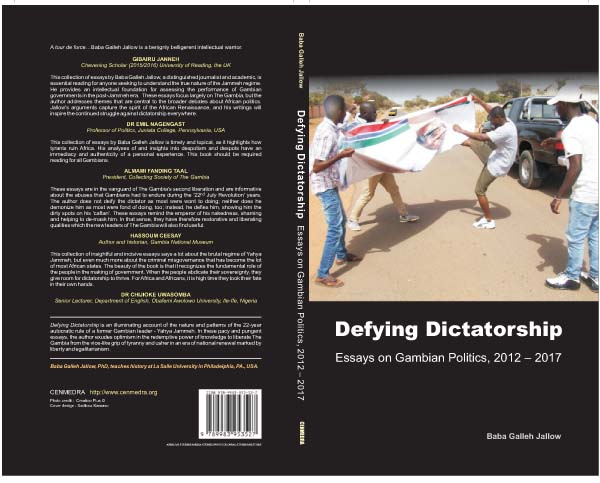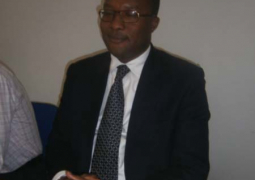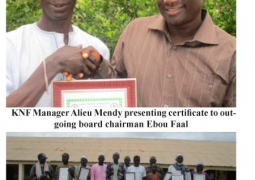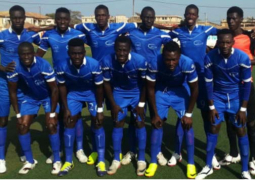
Prof
Pierre Gomez Associate Professor of Comparative Literature Dean, School of Arts
and Sciences The University of The Gambia Brikama Campus, P.O. BOX: 3530 The
Gambia
Defying Dictatorship: Essays on Gambian Politics, 2012 – 2017 is a collection of essays that expose the writer’s challenge against the governance and leadership of a dictator, in this case, Yahya Jammeh. The book is published in 2017 by the Centre for Media and Development Research in Africa (CENMEDRA).
Having experienced the brutality of dictatorship first hand, the author, Dr Baba Galleh Jallow, is well placed to comment on the brutality the Jammeh regime had wreaked on innocent citizens. Armed with advanced degrees in the humanities, Dr Jallow has since then been deploying his formida¬ble intellectual might and penmanship to defy and demystify Yahya Jammeh and his rogue regime. This work is a compilation of the essays he has written and published using different online newspaper and media outlets like Gainako, Kairo News and Maafanta to defy dictatorship and tyranny, hence the title Defying Dictatorship.
I wish to say a big thank you to these media, who over the years provided a platform that made it possible to share the essays in this volume with thousands of Gambian and non-Gambian readers.
In his dedication page, the author claims that the book is dedicated to the memory of all who lost their lives in the struggle against the backward dictatorship that ravaged The Gambia from 22 July 1994 to 1 December 2016. He further claims that publishing the book in The Gambia and making it available to the Gambian public is testimony to the victory of truth over lies, of justice over injustice and ultimately, of the pen over the sword.
The foreword was written by the Gambia’s new Information Minister, Hon. Demba Ali Jawo. In the foreword, Hon. Jawo recounts events leading to the author’s unshakable position of defying dictatorship. He claims that in Defying Dictatorship, Baba Galleh Jallow does not only criticize Jammeh but also repeatedly warns him of his impending fall from power and asserts that he and many other Gam¬bians refuse to be denied their right to express their opinions, criticize their gov¬ernment, and record for history and posterity the nature of the regime’s brutal crimes against the Gambian people.
From the introductory part of this book, the reader could easily see how Jallow thoroughly paints a realistic picture of a dictator. This chapter, titled “The Dictator”, gives a comprehensive description of how dictators behave and perceive society. Jallow claims that dictators are essentially paranoid and feed on public insecurity and fear. That there is not a single moment of a dictator’s life when they are not preoccupied with their personal security; when they do not imagine daggers lurking in the dark shad¬ows of their mind, waiting for an opportunity to pounce and stab them to death, that the dictator’s obsession with exercising total and absolute control over all affairs of the country causes them to by-pass all legitimate institutions of the state. Moreover, because they feel that every brutal action they take is legitimately taken in self-defense and self-preservation, the dictator manages to stifle their conscience and justify the most senseless of tyrannies inflicted upon their per¬ceived enemies.
This section enables the reader to demystify and recognize the semblance of dictatorship in the life we had lived between 22 July, 1994 and 19 January 2017. It offers all its readers an opportunity for self-reflection in order to gauge how we lived such dark days in our country’s history.
The book is written in forty-six chapters, and divided into two main parts. Part one consists of twenty-four chapters that look at “the many faces of dictatorship”, that the more you look into the life of a dictator, the less you see. Part two consists of twenty-two chapters that look at what the author called “People Power” showing the turning tide from first class complacence to outrageous defiance against tyranny.
The chapters in part one were published between November 8, 2012 and July 20, 2016. The articles in this first section are defiant in nature and attempt as best as possible to demystify Yahya Jammeh. Hence it is not a surprise that “Deconstructing Yahya Jammeh one, Deconstructing Yahya Jammeh two and Deconstructing Yahya Jammeh three” would be presented as chapters one, two and three respectively. These three articles were published between 2nd and 12th January 2015.
The author argues that the purpose of deconstructing Yahya Jammeh is not to merely criticize him, however justified such criticism may sound. Nor is the purpose simply to vent anger, how¬ever justifiable, at his systematic abuse of our rights and responsibilities as Gam¬bian citizens. It is meant to highlight the many contradictions that characterize Jammeh’s political character and his assertion of absolute power over Gambians while denouncing the absolute power of his colonial predecessors.
In these articles, Jallow succeeds in revealing the deceptive nature of the dictator; that in spite of Jammeh’s disregard for the rule of law, he still cites human rights or the rule of law although only under two particular circumstances: One, when it suits his personal interests to do so, and two, when he blames the West for allegedly meddling in the affairs of what he considers his personal country. He ignores constitutional provisions whenever they clash with his personal interests and cites them whenever they serve his personal interests.
Having brought Jammeh’s conniving and deceitful ways to the surface, the author goes further to respond to misconceptions about Jammeh being a “good dictator” compared to others as claimed by Mr Robert D. Kaplan; that Jammeh spoke “truth to power” as claimed by Mr Bill Jones; Jallow asserts that all dictators are political gangsters who hijack entire populations and cling on to power as long as they can and Jammeh is no exception.
The two chapters following these responses delve into Jammeh’s conflict with himself and his supercilious attitude of shifting the blame on to others; colonialism, the west and on his own people. In chapter nine, the author is to describe Jammeh as the worst kind of despotic ruler that the continent has ever witnessed.
Chapter ten looks at the Gambia’s withdrawal from the Common Wealth in October 2013. This is followed by the author’s discussion on the irony of celebrating independence that never was; insinuating that despots like Yahya Jammeh who deny their citizens their God-given rights, could preside over independence celebrations, truly beats one’s imagination.
Other notable issues discussed in this part would include answers to “Why Deyda’s killers are still at large”; “Why Sharia is not an option”; “Why America works and the Gambia not”.
The second part of this work is a collection of twenty-two articles published between May 2013 and March 2017. A common denominator of the articles in this second part is the shift from individual defiance to growing agitation among Gambians at home and in the diaspora, presenting a beacon of hope for a new dawn.
The author acknowledges that every revolution is inspired by outrage; outrage at the spectre of a small minor¬ity in power oppressing a large majority of citizens. Outrage at gross injustices and often unbelievable socio-economic and cultural hardships majorities endure under oppressive political regimes. He was quick to add that revolutions succeed not only to the extent that they are also inspired by a burning desire to empower politically the powerless major¬ity so that never again will they be oppressed by a minority, but also to the extent that they genuinely follow through and actualize such popular empowerment. The nation always bears within itself the resources requisite for its own empowerment. This perhaps is what every well-meaning Gambian needs in order to move this country forward.
On October 19, 2015, Jallow wrote “Navigating the Obstacles”. In this article, he responds to two notable counter arguments to his articles “Looking beyond the Power Grab” and “The Disengaged Public”. The didactic function served by this article is that beyond rejecting imposed opinion and injustice with all our might, we must tolerate disagreements and criticisms from our fellow citizens and from other people, however unreasonable, however unjustified, however much we think them motivated by bad faith, or by loyalty to certain selfish and parochial interests of a political nature.
“A Gambian hypothesis” is a chapter that prophesied the nearing end of the dictator, following recent trends in his increasingly erratic be¬haviour, his irresponsible and hubris-driven pronouncements, his chest pounding and his increasingly bold insults and assaults against both local individuals and institutions and global institutions. These all point to one possible conclusion: that the fate that befalls every dictator is about to befall Yahya Jammeh!
One argument the author presents is his direct attack on his fellow African rulers when the issue of term limit was raised. The June 6, 2015 online edition of The Standard newspaper: captures the following:
“Now they [West] are trying to use ECOWAS. They said Yahya Jammeh cannot be changed by elections. They want to use their stooges in ECOWAS to impose term limit because that is … a Western agenda. Where were the so-called Western leaders today 20 years ago when I became head of state? Let me warn ECOWAS - Gambia is nobody’s colony and our development is not dependent on ECOWAS that has already failed because it has been hijacked by the West. Even if the whole world introduced term limit, I will not have a term limit and let me see what you can do. Democracy is power to the people and not power to the West. I am a pan-Africanist, but I will not subscribe to any institution that is hijacked by the West and is used against Africa. If it is the AU, I will leave AU; if it is ECOWAS, I will leave ECOWAS, but I will not be given lectures by any of these institutions on behalf of the West. Tell me about one electric pole here which was installed by the AU (African Union) or ECOWAS or by the British or the Americans. We are not fools! Let them mind their own business.”
Jallow goes further to suggest the ideal presidency where he draws a contrast between American leaders and African leaders like Yahya Jammeh. He contends that unlike African leaders (i.e. Yahya Jammeh) who build roads, hospitals and monuments to be displayed as the marks of their achievement, but neglect building the most precious and powerful resources of their nations: their people’s minds; knowing fully well that building the people’s minds is building the people’s power, and therefore giv¬ing the people the opportunity to question their actions and boot them out of power if they misbehave; American presidents feel their power as a humbling experience because they feel the power of their people and know that while they occupy the most powerful office in the world, their success and very survival depends on recognizing the extent of the power of their people in general and their colleagues and opponents in Congress and the Judiciary in particular. American presidents cannot just wake up and decree the passage of a law, or have someone arbitrarily arrested and detained, or fire a judge, a secretary of state or a director without as much as a single word of explanation. So until such a time that African leaders begin to see their presidency as a humbling experience, the continent may continue to produce dictators of the worst kind.
Chapter thirty is an “Open Letter to President Jammeh: On granting amnesty to the Gambian Diaspora.” In this chapter, the author described the move as a potential beginning for positive change and gave some advice to Jammeh which include: instituting a term limit; annulling the 2015 Elections Amendment Law; considering alternative views especially from members of the opposition. In reading this article, one could easily decipher the genuine and honest advice the author gives Jammeh with a view to seeing him succeed which would also be in the best interest of our country.
In “Why Jammeh jippo”, the author invokes an intertext from the memorable and widely popular phrase coined by Assan Musa Camara asking Jawara to step down “Jawara Jippo” (Jawara step down). Jallow argues that it was time to say “Jammeh Jippo” because he is on record saying that “We will never allow anyone to stay in power beyond ten years. In fact, ten years is too much.” So after 22 years in power, jippo becomes the most appropriate caution; jippo because back in July 1994 when he seized power, he repeatedly assured Gambians “we are not here to stay”; jippo because you are on record declaring that one of your primary reasons for toppling Jawara was that he had overstayed in power. Jammeh Jippo because staying in power beyond ten years is just as bad today as it was before 22 July 1994.
Of course, the author goes on to insinuate that one can understand why Jammeh Jippo is not an attractive idea at Kanilai Farms. Among other things, it is difficult to imagine oneself going from being the wealthiest and most powerful person in the land, to an ordinary citizen arraigned before a court of law on charges of corruption or human rights viola¬tions. The lesson is clear, “the way you make your bed, so you shall lie on it”.
Chapter thirty-three entitled “God is not to blame: Some talking points for our alternative leadership”, points out some critical talking points for our alternative leadership in their rallies. For in¬stance, since 1994 when Yahya Jammeh became president, America has had three presidents: Bill Clinton was president for eight years; George W. Bush was president for eight years; Barack Obama has been president for eight years. Jallow cites another example, Britain. That since Yahya Jammeh became president in 1994, Britain has had six lead¬ers: Margaret Thatcher, John Major, Tony Blair, Gordon Brown, David Cameroon and most recently Theresa May. What the author alludes here is that the myths associated with “mansaya” and “mansa kunda” are deeply entrenched in our people’s collective consciousness; that people cannot become leaders without God’s will. He concedes that this provision is a tricky space to manoeuver because in a deeply religious community such as ours, there is no way to refute it convincingly.
In “For Jammeh, God is yet to speak”, the author preaches humility; that there is The God who destines, and that Jammeh’s change of heart to refuse the 1st December election results and attempts to subvert the will of the Gambian people is as futile as flogging a dead horse. Jallow argues that judging from Jammeh’s actions and pronouncements on the eve of the 1 December elections, it is clear that he did not think he was going to lose. He had de¬clared that Gambia’s electoral system was rig-proof and that for this reason, no demonstrations challenging the results would be allowed after the elections. On Election Day he had both the Internet and international phone connections to The Gambian shut off. He was expecting to win big and then accelerate his oppression and tighten his grip on the already suffocating country and its population. But God spoke in our favour and the dictator has become history.
In “no retreat, no surrender”, “Not politics as usual 1” and “Not politics as usual 2”, chapters 37, 43 and 44 respectively, the author highlights the changing tide of an exceedingly complacent population cowed by brutality and intimidation of exclusion, to a people declaring relentless war against dictatorship; that for 22 years, Yahya Jammeh has treated The Gambia as if it were his personal property and Gambians as if they were nothing but his personal slaves with no right to disagree with anything he said or did. These chapters show the transformation in the population to speak up and speak out against oppression. The author adds that the appointments of Hon. Demba A. Jawo as Minister of Information and Ebrima Sillah as Director of GRTS can only promise well for our country; promising freedoms of expression and of the press. He assures that both Hon. Demba A. Jawo and Ebrima Sillah are men of principle who will not compromise their jour¬nalistic ethics and integrity when it comes to doing the right thing in their new positions of responsibility, hoping that in the new Gambia, the politics of media relations will not be what they were under the Jammeh regime. That both GRTS and other public and private media must make it a point to enlighten and empower the Gambian people. Other notable chapters that would perhaps whet your interest to read this work would include “What Jammeh wants”, “Please don’t die for Jammeh”, “Why we need a truth and reconciliation commission”.
At this juncture, I wish to salute and applaud the author, Dr. Baba Galleh Jallow, for such an extraordinary piece. The articles are apt and have discussed the bane of our leadership. I am sincerely moved by the energy and vigour with which he writes his over forty articles for ideals he and many other Gambians share. His efforts are commendable, and assuming that his post has followers, he has no doubt contributed greatly to ensuring regime change in the Gambia and for that we are greatly indebted.
As I conclude, I wish to emphatically state that contrary to popular belief that Gambian intellectuals have not mustered courage to defy dictatorship, the essays in this book are a clear testimony of one of Gambia’s finest intellectuals who could not shut his eyes to watch our God-given rights being trampled upon. The message to the dictator and all other dictators around the world is that not all voices can be silenced; that the truth can be hushed but never extinguished, and that as history has shown again and again, that however long dictators reign supreme, they will, someday, fall into the dustbin of history.
At this point, I urge you all to grab a copy of this all-too essential reading for yourselves and your families and in our absence, live it as a rich legacy unto your issue. At least we owe that to the next generation!
I thank you all for your undivided attention. God bless you all.




